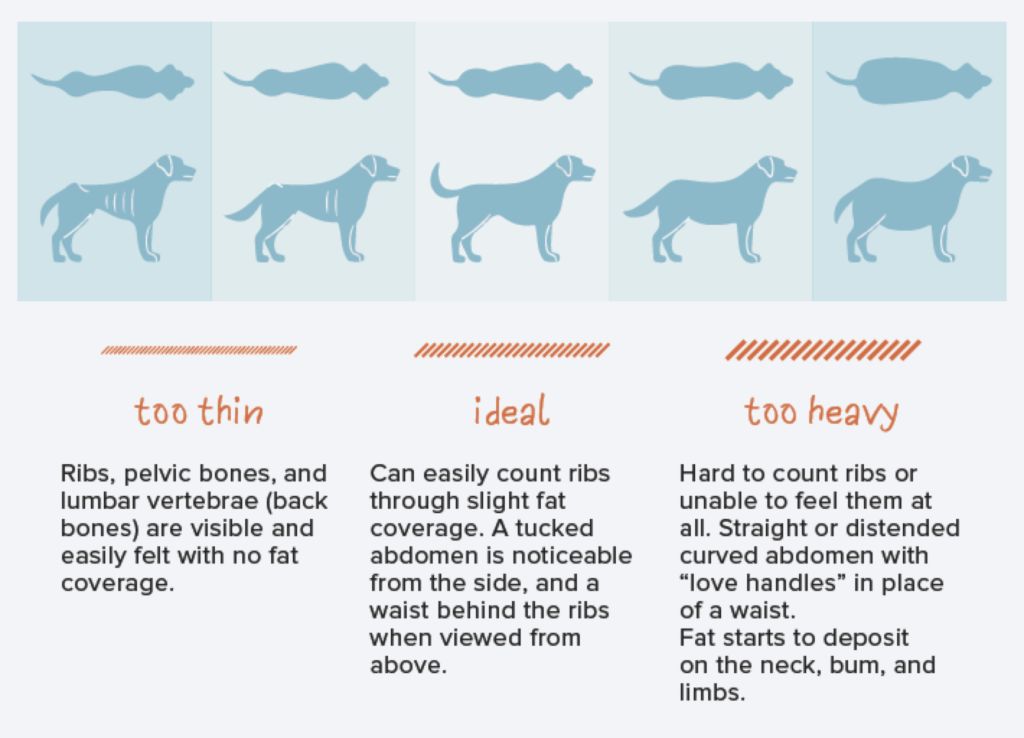Is my dog overweight?
No matter their shape or size, we love our dogs just the same. But if you’ve ever questioned whether your pup is a little too fluffy, this post is for you.
Weight loss can be a sensitive subject (for humans and canines) thanks to a variety of views—some more problematic than others—on what constitutes “too big” or “too small.” At the end of the day, we all want the same thing: for our dogs to be happy and healthy.
If you’re in quiet agony wondering, “Is my dog overweight?” or “Is my dog too fat?” we’re here to put you at ease. All bodies are good bodies, but there are things us dog parents can do when weight is becoming an issue, and ways to help our dogs lose weight that are both healthy and sustainable.
How do I know my dog is overweight?
First we need to tackle a definition: obesity. Obesity is the accumulation of an excessive amount of body fat.
EXPERT TIP: Most, if not all, clinics will offer courtesy weigh-ins. While you’re there, ask for advice on what your dog’s ideal BCS might be.
What does this mean? Considering different dogs have different body types, it makes sense each dog carries weight in a slightly different way—and that’s okay! A healthy weight won’t look the same on all breeds of dogs, which is why it’s more valuable and important to understand your dog’s ideal weight… or, better yet, their ideal body condition score (BCS).
Calculating your dog’s BCS can be tricky because there are several ways to go about it. We recommend starting out by consulting with your family vet. Keep in mind that the number you both agree on is, ultimately, an educated guess based on your dog’s body frame. Dynamic factors like age and life stage can easily cause things to fluctuate.
We’ve also created this Waggle Mail BCS chart for the more visually inclined:

Using BCS to find out if your dog is overweight
Now that you have your dog’s BCS as a general guideline, you’re probably hungry for an answer to the question, “Is my dog overweight?”
Time for a quick math lesson.
As a rule of thumb, your dog will likely be considered obese when their weight is >20% above their ideal BCS. A result between 10-19% usually classifies as overweight.
Let’s use Maximus, a 4-year-old snuggly, sedentary bulldog, as an example. Maximus clocks in around 85lbs; both his veterinarian and family agree he could stand to lose a few (15, to be exact). There’s no question that Maximus is well loved and lives a good life, but he absolutely meets the criteria for obesity.
Current weight (85lbs) – ideal weight (70lbs) = 15lb difference
(15/70) x 100 = 21.4%, which is more than 20% above Maximus’ ideal weight
Weight gain and health risks
Dogs gain weight when there is an imbalance between the energy they’re taking in and what they’re expending or putting out. It’s as simple as that.
Dog parents often answer the question, “Why is my dog fat?” by pointing the finger of blame at themselves. Although sometimes it is the case that we love our dogs a little too much, spoiling them with an overload of calorie-rich foods and treats, there are plenty more variables that factor into the weight gain equation.
First, it’s important to understand that obesity is considered a chronic inflammatory disease. This is because fat cells (adipocytes) and fat tissue (adipose tissue) are both endocrine organs. Fat cells send out signals called adiopkines that impact metabolism, immune function, and even cardiovascular function. Too many fat cells sending too many signals leads to inflammation and, in some cases, permanent damage.
Dogs that are overweight and obese are at a higher risk of a variety of health conditions such as:
EXPERT TIP: Serotonin (the body’s “happy hormone”) presents higher in lean patients than in obese patients, so health really does equal happiness!
- Heart and lung disease
- Insulin resistance and diabetes
- Osteoarthritis and hip dysplasia
- Kidney and thyroid disease
Although many of these can be effectively managed through vet-recommended treatment protocols, there is always the risk of a shortened lifespan with increased pain and discomfort. Not something we want for our furry companions.
Why is my dog overweight?
EXPERT TIP: Labrador and flat-coated retrievers actually have a specific gene mutation (the POMC gene) that affects both their appetite and their body weight.
Researchers have identified a number of factors that may predispose dogs to weight gain, but here are the four most common ones:
1. Too much food and too little exercise. Too much couch time without regular walks can cause your dog to chunk up. The same is true for feeding patterns: feeding excessive snacks and table scraps, failing to portion-control meals, and offering high fat/low fibre diets all promote weight gain.
EXPERT TIP: Vegetables are a low-calorie favourite of our founder, Dr. Beck. Try slicing up cucumbers and freezing them as a crunchy, cool treat perfect for a hot summer day. We also source health-forward, low-calorie treats for our Waggle Mail dog subscription box pups with specific medical conditions and nutritional needs.
2. Breeds and associated genetics. Certain breeds tend to gain weight more quickly than others. This list includes Beagles, Dachshunds, Cocker Spaniels, Dalmatians, Pugs, Pomeranians, Rottweilers, and a variety of retrievers (golden, labrador, and flat-coated).
3. Age and gender. Weight struggles tend to peak within the broad age range of 5-11 years of age and the frequency of obesity typically drops off after their 12th birthday. Interestingly enough, females are often more predisposed to weight gain than males.
4. Endocrine disorders. There are many conditions that can cause or in some way link to packing on the pounds. Some of these include an underactive thyroid gland (hypothyroidism), an overactive adrenal gland (hyperadrenocorticism), and diabetes.
How to help your dog lose weight
Because weight gain is an energy imbalance issue, the first and often best course of action to help your dog lose weight is to modify their feeding regime and increase exercise. Simple in theory, sure, but this can be tough in practice.
The good news is there’s plenty you can do to support your dog on their journey to a happy, healthy weight. Your veterinary team is a terrific ally and support group, too!
Smart, sustainable weight loss strategies:
EXPERT TIP: A reasonable weight loss goal for your overweight dog is between 1-2% of their body weight per week. Remember Maximus? A reasonable goal for him at 2% of his body weight works out to 0.02 x 80 = 1.6lbs down every week until he reaches his goal of 70lbs. If he sticks to a consistent plan, he’ll hit that goal in about 9-10 weeks.
- Monitor the scale. Book regular courtesy weigh-ins at your local clinic so you can track your dog’s progress.
- Run the numbers. Ask for help in calculating your dog’s caloric needs for weight loss. There’s a formula us veterinarians use based on your dog’s target ideal weight to provide a path for slow and steady weight loss.
- Decide on a diet. Which diet will put your dog closer to their ideal weight really depends on circumstance. Some dogs will need to go on a dedicated weight loss formula for quite a while; these diets are low in fat but enhanced in both fibre and protein to keep your dog feeling fine, fit, and full.
- No cheating. If you decide to slip your dog what’s left after Thanksgiving dinner, document it. Accounting for everything your dog eats (including treats and dental chews) means you’ll have an accurate picture of caloric intake and how close or far you are to your target.
- Exercise body and mind. Increasing your dog’s physical and mental exercise is a win for everyone! Try putting their food into puzzle balls to get them moving at meal time, or schedule in a few quick sessions of fetch in the backyard. A daily walk is an excellent family bonding activity. For dogs with low-impact exercise needs, hit the pool!
Above all, be patient and kind to yourself and your dog. Weight loss isn’t easy, but it is doable with the right mindset, tools, and supports.
Like what you read? Subscribe to Waggle (e)Mail for even more health-focused tips, tricks, and resources.

